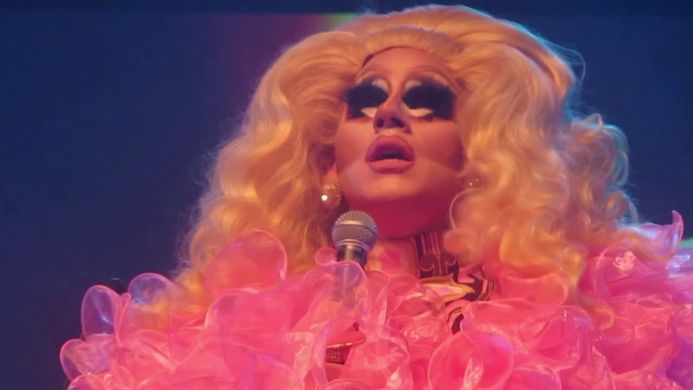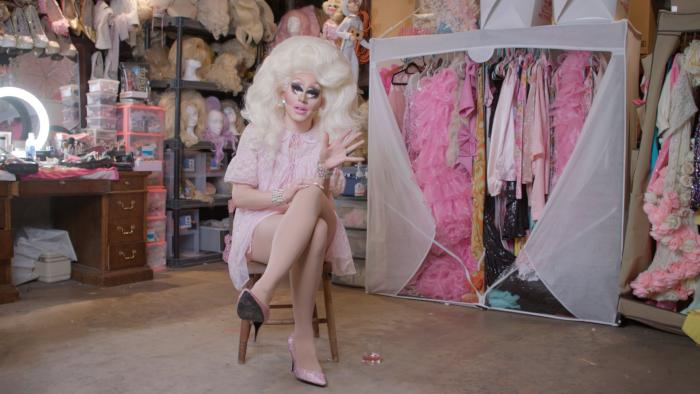By Glenn Dunks
The Film Experience and Doc Corner are celebrating Pride Month with a focus on documentaries that tackle LGBTIQ themes. We had planned to cover the new HBO doc Wig about the return of Wigstock, but HBO wouldn't allow it so now Trixie Mattel is here being reviewed all by herself.
Brian Firkus aka Trixie Mattel needs no introduction to fans of RuPaul’s Drag Race, but a new documentary made by director Nicholas Zeig-Owens and the World of Wonder production house that produces the series seeks to do just that. Treading fairly similar ground to Drag Becomes Him about season five winner Jinkx Monsoon (fellow Drag Race contestants BenDeLaCreme appears in both being sage and wise), Trixie Mattel: Moving Parts follows a year in the life of the folk-singing drag queen with the face of a Dollywood beauty pageant.

Knowing precisely what fans will be watching a movie like Moving Parts for, Zeig-Owens begins with the mental breakdown of her UNHhhh and The Trixie and Katya Show co-star, Brian Joseph Cook aka Katya Zamolodchikova...
It’s a sequence that suggests its director (making his feature documentary debut) will be going for something darker and confronting than the costumes and the wigs and the ukuleles would normally suggest. And while the splintered relationship between these two queens – both fan favourites, drawn together by their oddball sense of humours and initial disappointing Drag Race outings – lingers over the entirety of Moving Parts, in many ways the film ultimately has to move on because Trixie is in no position to sit still.
“Moving Parts” isn’t just the name of her album, you see. She is, after all, recording albums, setting out on world tours, enduring the social media hell of a run on RuPaul’s Drag Race All Stars and the stress of being a celebrity (albeit a niche one), and attempting to corral the final episodes of her Viceland television series into some sort of smooth landing alongside Bob the Drag Queen. If she is not an industry herself, then she is certainly a part of one. An industry, the mechanics of which are ever-grinding and unwiedly and oftentimes unforgiving as we see so well not just in Katya’s breakdown but Trixie’s own struggle that at times appears as if it may topple over if not for the heartfelt appreciation she clearly relishes from her dedicated fans, many of whom hold Trixie Mattel responsible for saving their lives. And even that is quite the burden to bear as seen when she harshly castigates herself for a flubbed or forgotten lyric on stage.

Captured mostly in fly-on-the-wall moments with the occasional talking head in Mattel’s garage full of wigs and gowns, Zeig-Owens’ camera often finds its way into spaces that clearly make Firkus uncomfortable. For that, he should be commended. As we have seen plenty of times – most recently with a controversial Vulture article – those who are not of this world can often struggle to find a way in. That Firkus appears to have more or less allowed the director to show the Trixie story warts and all is a relief.
Of course, Trixie the stage persona remains as ebullient as ever with her outrageously oversized wigs and divine costumes of pink and yellow. Fans of Trixie’s music, the albums Two Birds and One Stone, are well served and the live performances are captured nicely if not perhaps with the sort of slickly edited panache that people will be more familiar with from Drag Race.
Trixie Mattel: Moving Parts is not a great movie, but it’s one that does its subject justice and showing their multifaceted personality in such a way that fans and drag novices alike will surely appreciate and understand. The return of Katya to the mix at film’s end feels somewhat bungled as the conclusion of the film’s most intriguing dramatic arc; likewise the personality that Mattel often exhibited on her two seasons of Drag Race often manifests itself within Firkus himself and those walls that he was often criticised for remain standing throughout some awkwardly terse moments.

Amid all of the glitz of her whirlwind life, however, perhaps the thing that Moving Parts gets best is Firkus’ existential worry that his career is so tied to that of somebody else (Katya) that the dissolving of their friendship could mean the end of his it. What if people are only watching for Katya? It’s a theme that I suspect many viewers will be familiar with if not for the specifics then at least the mental gymnastics that these kind of headspace hypotheticals can result in.
Release: Awaiting distribution. I can't imagine it won't show up on Bravo at some point if nothing else. Until then, it is making the international festival circuit.
Oscar chances: LOL.